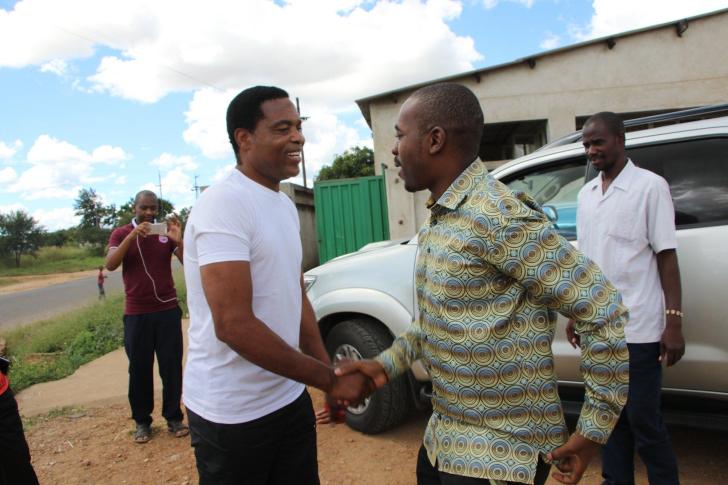News / Local
Jabulani Sibanda slams tribalism as 'nation-killer'
26 Jun 2025 at 13:20hrs |
0 Views

ZANU-PF Bulawayo Provincial Chairperson Jabulani Sibanda delivered a powerful rebuke of tribalism on Wednesday, warning that the persistent scourge is tearing Zimbabwe apart and undermining national development.
Speaking at the 2nd Edition of the Land Tenure Implementation Committee Programme held at the National University of Science and Technology (NUST), Sibanda passionately called for the rejection of ethnic divisions, declaring that Zimbabweans must unite as one people regardless of language or tribal affiliation.
"Tribalism is killing us," Sibanda said to loud applause. "We are one people speaking different languages. I can speak any language because I'm a human being - not because I'm Ndebele or Tonga."
He went further to denounce the common usage of ethnic identifiers such as muShona and muNdebele, insisting they are divisive and dangerous. "There's no muShona, no muNdebele - we are one!" he thundered, urging Zimbabweans to embrace a national identity that transcends tribal boundaries.
The event, part of the Leadership Success Series, brought together stakeholders from politics, business, and academia to deliberate on land reform, national growth, and entrepreneurship. It was headlined by prominent businessman and Land Tenure Implementation Committee Chairperson, Kudakwashe Tagwirei.
Tagwirei, who has recently sparked debate over his controversial remarks on government tenders, focused his address on strategies to unlock the economic value of land. He encouraged budding entrepreneurs to view land as a cornerstone of empowerment and productivity, offering insights on land-based wealth creation.
The high-profile gathering attracted influential figures from across the country, signalling a growing urgency to confront Zimbabwe's longstanding ethnic tensions while promoting inclusive economic development.
Sibanda's blunt remarks on tribalism come at a time when language and ethnic divisions remain a sensitive subject in Zimbabwe, often flaring up in political discourse and public institutions, including Parliament.
Observers at the event welcomed Sibanda's intervention as a timely reminder of the need for unity in a country still grappling with the legacy of historical divisions and marginalisation.
As the Land Tenure Implementation Programme advances its work, leaders like Sibanda and Tagwirei are positioning the platform as not just an economic conversation, but also a national dialogue about identity, inclusivity, and shared prosperity.
Speaking at the 2nd Edition of the Land Tenure Implementation Committee Programme held at the National University of Science and Technology (NUST), Sibanda passionately called for the rejection of ethnic divisions, declaring that Zimbabweans must unite as one people regardless of language or tribal affiliation.
"Tribalism is killing us," Sibanda said to loud applause. "We are one people speaking different languages. I can speak any language because I'm a human being - not because I'm Ndebele or Tonga."
He went further to denounce the common usage of ethnic identifiers such as muShona and muNdebele, insisting they are divisive and dangerous. "There's no muShona, no muNdebele - we are one!" he thundered, urging Zimbabweans to embrace a national identity that transcends tribal boundaries.
The event, part of the Leadership Success Series, brought together stakeholders from politics, business, and academia to deliberate on land reform, national growth, and entrepreneurship. It was headlined by prominent businessman and Land Tenure Implementation Committee Chairperson, Kudakwashe Tagwirei.
Tagwirei, who has recently sparked debate over his controversial remarks on government tenders, focused his address on strategies to unlock the economic value of land. He encouraged budding entrepreneurs to view land as a cornerstone of empowerment and productivity, offering insights on land-based wealth creation.
The high-profile gathering attracted influential figures from across the country, signalling a growing urgency to confront Zimbabwe's longstanding ethnic tensions while promoting inclusive economic development.
Sibanda's blunt remarks on tribalism come at a time when language and ethnic divisions remain a sensitive subject in Zimbabwe, often flaring up in political discourse and public institutions, including Parliament.
Observers at the event welcomed Sibanda's intervention as a timely reminder of the need for unity in a country still grappling with the legacy of historical divisions and marginalisation.
As the Land Tenure Implementation Programme advances its work, leaders like Sibanda and Tagwirei are positioning the platform as not just an economic conversation, but also a national dialogue about identity, inclusivity, and shared prosperity.
Source - zifm
Join the discussion
Loading comments…



































